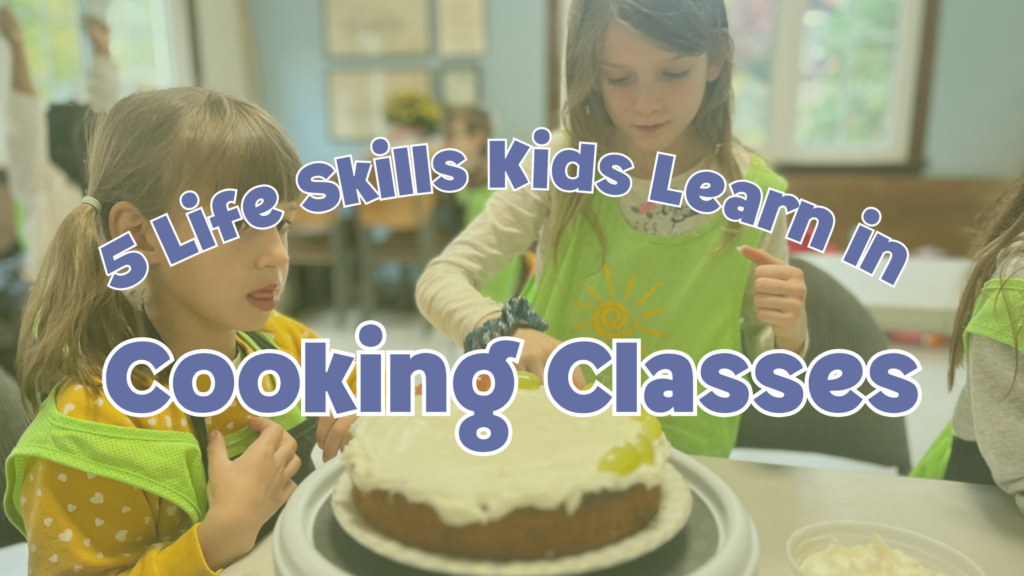
When kids step into the kitchen, they do more than just make meals. They’re gaining essential life skills that will serve them well into adulthood. At Jardin Infantil Academy’s After-School Cooking Program, children ages 6-10 explore the world of culinary arts while developing confidence, teamwork, and creativity in a fun, hands-on environment.
Cooking is more than just a practical skill. It builds a foundation for problem-solving, communication, and healthy habits. Here are five valuable life skills your child will develop in a kids’ cooking class and why every parent should encourage their child to get cooking.
1. Confidence & Independence
There is nothing like the pride of making a meal from scratch. Cooking teaches kids to trust themselves, follow directions, and complete tasks on their own.
By measuring ingredients, chopping vegetables, and plating their own dishes, children gain a sense of responsibility and accomplishment. Even small successes, like flipping a pancake or kneading dough, build confidence and independence, preparing them to take on new challenges.
How our program encourages confidence: Each class, young chefs take on new skills that make them feel capable and excited to try new things.
2. Teamwork & Communication
Cooking is a collaborative experience, just like being part of a team. At Jardin Infantil Academy, kids work together to prepare, cook, and serve their creations while practicing patience and clear communication.
They learn to:
- Follow instructions from teachers and peers
- Take turns measuring, stirring, and plating
- Problem-solve as a group if something doesn’t go as planned
These team-building skills aren’t just helpful in the kitchen. They also strengthen friendships and support success in school and future careers.
3. Problem-Solving & Critical Thinking
What happens if you add too much flour to dough? What do you do if you forget an ingredient? Cooking challenges kids to think critically and make adjustments in real time.
Following a recipe requires:
- Math skills, such as measuring ingredients and dividing portions
- Scientific thinking, like understanding heat, texture, and chemical reactions in food
- Creative problem-solving, including adjusting seasonings, fixing mistakes, or substituting ingredients
Every recipe is a new challenge, helping kids develop logic, creativity, and resilience.
4. Cultural Awareness & Language Development
Cooking is an exciting way to experience different cultures without leaving the kitchen. At Jardin Infantil Academy, our multilingual immersion program introduces children to new languages and traditions through food.
Each class, kids learn:
- Words and phrases in Spanish and French related to cooking
- Traditional dishes from different countries
- The history and significance of global cuisine
For example, while making homemade pasta, they might learn:
“Pasta” in French is “pâtes”
“Chef” in Spanish is “cocinero”
Experiencing language through food helps children absorb new words naturally while engaging in something they enjoy.
5. Healthy Eating Habits & Nutrition Awareness
Kids who cook are more likely to try new foods and make healthier choices. When children prepare their own meals, they learn about:
- The importance of fresh ingredients
- Portion control and balanced meals
- How different foods fuel their bodies
Our cooking classes introduce kids to a variety of flavors and textures in a way that makes healthy eating fun. When kids participate in meal prep, they are more likely to eat what they create, even the vegetables.
How our program encourages healthy eating: We teach kids to appreciate different types of food while understanding the benefits of nutrition and healthy meal choices.
At Jardin Infantil Academy’s After-School Cooking Program, we believe that cooking is more than just a skill. It is a foundation for life. From confidence and teamwork to problem-solving and cultural awareness, our young chefs gain experience that extends far beyond the kitchen.
Ready to give your child the gift of hands-on learning and lifelong skills?


